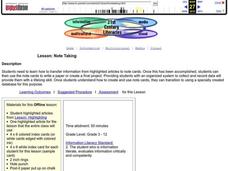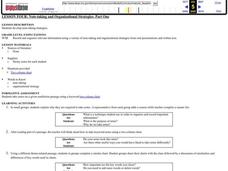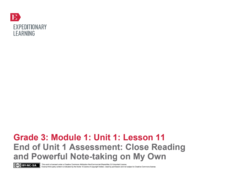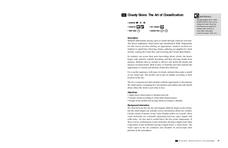Curated OER
Global Wind Patterns Notes
In this global wind patterns worksheet, students take notes on the wind patters in the southern and northern hemispheres. They indicate the latitude the winds occur at, the pressure, the characteristics and the direction the wind moves....
Curated OER
Note Taking
Students discover how to transfer information from highlighted articles to note cards. Providing students with an organized system to collect and record data provide them with a lifelong skill.
Curated OER
Note-Taking and Organizational Strategies
Students explore note taking. For this study skills and nonfiction comprehension lesson, students complete a two column main idea chart while reading a nonfiction passage.
Curated OER
Note Taking and Organizational Skills: Part Two
Students explore organizational strategies by utilizing an information web. In this note taking instructional activity, students investigate the uses of an outline when taking notes. Students utilize notes from a class instructional...
EngageNY
End of Unit 1 Assessment: Close Reading and Powerful Note-Taking on My Own
As the final lesson plan in a larger beginning-of-the-year unit to establish routines and teach close reading skills, this plan is designed as an assessment piece. Using the story, The Librarian of Basra, learners independently complete...
C-SPAN
Choice Board - Conversations with Suffragists
Celebrate 100 years of women's suffrage by planning a re-enactment of famous women discussing their fight. After learners view a series of interviews with famous women played by actors, including Susan B. Anthony, Sojourner Truth, and...
Curated OER
Rosencrantz and Guildenstern Are Dead: "Teach Each Other" Discussion
Challenge your class to hold a discussion about the theme of death in Rosencrantz and Guildenstern Are Dead without direct teacher guidance. After going over the discussion protocols and quotes from the text, learners move in a circle...
Santa Monica-Malibu Unified School District
Parts of Speech Adverbs: Building Blocks of Grammar
What is the difference between an adjective and an adverb? Encourages scholars to explore the answer to this question while building a foundation of the English language. The instructional activity comes complete with an attention...
Curated OER
Arab Spring: Unrest in the Middle East, 2011-2012
The conflict in the Middle East is a hot topic that can be somewhat confusing. In order to better grasp the who, what, where, when, and why of this world affair, learners fill out a chart. They record basic facts about each country...
Austin Independent School District
Visual Discovery Note Taking Sheets
Step into history and step out with a new understanding of events. These strategies bring a new level of understanding of key events by asking viewers to engage in and respond to projected images. Complete directions for the activity, a...
EngageNY
Mid-Unit Assessment: On-Demand Note-Taking, Analysis, and Reflection: “Should We Drill?”
Pupils take a mid-unit assessment, completing a point of view graphic organizer based on an informational article about offshore drilling. Next, learners answer text-dependent and short-answer questions about the text.
EngageNY
Text to Film Comparison: Taking a Stand at the Jailhouse (Chapters 14-15)
Readers look closely at Scout in chapter 15 of To Kill A Mockingbird. Learners use turn and talk and Analyzing Scout's and the Reader's Perspectives Note-catcher to compare their perspectives to Scout's. They then make a comparison to...
Curated OER
Taking Notes from Written Documents
In this notetaking skills worksheet, students discuss the main events and opinions of a document, as well as listing three things the document tells about life at the time it was written.
Curated OER
Why is The Sky Blue?
Students explore why the sky is blue. In this light lesson, students conduct an experiment using water, flashlights, and milk to test why the sky is blue. Students view a PowerPoint, take notes on their results and draw conclusions.
Curated OER
Digging Up Dino Data
Third graders use the Internet to research a specific dinosaur. They work in pairs and individually to browse dinosaur websites, take notes on pertinent information, write, edit and illustrate reports. They post their work.
Curated OER
Lesson: Snake Handling
Are the studies of art and archeology connected? You bet they are! Young scholars research the ancient temples of Mexico by visiting an archaeology site. They describe the various temples they see, taking note of shapes, stairs, details,...
Bekshire Museum
Cloudy Skies: The Art of Classification
Such a great resource and perfect for learners in Kindergarten through third grade. The class will discuss cloud types and formation, and then they'll get outside and draw as they observe the clouds they see. They'll need to take note of...
PBS
Climate Change as a Scientific Theory
Get your class thinking about climate change as a scientific theory. Guided by a handout, emerging earth scientists read articles and take notes about glaciers and sea ice. To conclude, they write an evaluation of the evidence for...
Scholastic
Study Jams! Skeletal System
A dazzling display colorful computer-generated images, x-rays, and photographs create a comprehensive introduction to the skeletal system. With 12 slides in all, aspiring anatomists learn that there are 206 bones in the human body and...
EngageNY
Researching about the Red Cross, Continued: Who Is the Red Cross and What Does This Multinational Organization Do?
Code red! Learners read an informational article about the Red Cross, discussing the gist of the text in small groups. On a three-column note catcher, pupils take notes to show how the Red Cross functions as a multinational aid...
Curated OER
Exploring Arizona's Biotic Communities Lesson 1: Mapping Biotic Communities
As part of a unit on Arizona's biotic communities, young ecology learners create a map. They describe how humans and animals adapt in their habitat. They take notes and create graphic organizers from articles they read. Beautiful maps,...
K12 Reader
The Scientific Method
Introduce the scientific method with a reading comprehension activity. Have kids read a few paragraphs that describe the process of making a hypothesis, gathering evidence, and taking notes that will support the experiment.
Great Books Foundation
Discussion Guide for Little Women
Start with the question in mind with a discussion activity on Louisa May Alcott's Little Women. With four focus questions, note-taking prompts, and discussion points, readers practice answering thematic questions based on textual evidence.
Curated OER
All Americana
Fifth graders research American landmarks and symbols. In this United States history lesson plan, 5th graders create a KWL chart about the symbols of America and take notes during a PowerPoint presentation. Students complete the rest of...
Other popular searches
- Taking Notes While Listening
- Taking Notes for Research
- Note Cards Taking Notes
- Taking Notes and Nonfiction
- Research Taking Notes
- Taking Notes for Math
- Taking Notes for Papers
- Language Arts Taking Notes
- Taking Notes on Articles
- Taking Notes Lesson Plans
- Taking Notes While Reading
- Taking Notes During a Video

























